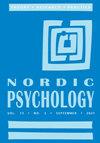Experiential avoidance mediates the relations between mindfulness and PTSD symptoms severity in terrorist attack survivors
IF 1.1
4区 心理学
Q4 PSYCHOLOGY, MULTIDISCIPLINARY
引用次数: 9
Abstract
Abstract There is substantial evidence supporting the robust dissipative influence of mindfulness on posttraumatic stress disorder (PTSD) symptoms, but its mediating pathway has been rarely explored. The present study aimed at determining whether the relationship between mindfulness and PTSD symptoms is mediated via the mechanism of experiential avoidance (EA). This cross-sectional study involved 577 survivors of Fulani herdsmen attack in South-eastern Nigeria. Igbo language version of the Mindful Attention Awareness Scale, Acceptance and Action Questionnaire II, and PTSD Symptom Checklist for DSM-5 were completed by the participants. Multiple regression analysis was used to examine the independent association between mindfulness, EA and PTSD symptoms. Hayes PROCESS macro for SPSS was employed for mediation analysis. Results revealed that mindfulness was directly and negatively associated with PTSD symptoms and was also negatively associated with PTSD symptoms via the pathway of lower EA. EA was also directly and positively associated with PTSD symptoms. These findings underscore the importance of incorporating mindfulness and acceptance-based behavioural change intervention in the management of PTSD in survivors of a terror attack as it may be beneficial in disabling PTSD symptoms through a decrease in EA.经验回避在正念与恐怖袭击幸存者PTSD症状严重程度之间起中介作用
有大量证据支持正念对创伤后应激障碍(PTSD)症状的强大耗散影响,但其介导途径很少被探索。本研究旨在确定正念与PTSD症状之间的关系是否通过经验回避(EA)机制介导。这项横断面研究涉及尼日利亚东南部富拉尼牧民袭击事件的577名幸存者。被试完成伊博语版正念注意意识量表、接受与行动问卷II和DSM-5 PTSD症状检查表。采用多元回归分析检验正念、EA和PTSD症状之间的独立关联。采用SPSS的Hayes PROCESS宏进行中介分析。结果显示,正念与PTSD症状直接负相关,并通过低EA途径与PTSD症状负相关,EA也与PTSD症状直接正相关。这些发现强调了将正念和基于接受的行为改变干预纳入恐怖袭击幸存者创伤后应激障碍管理的重要性,因为它可能有助于通过减少EA来消除创伤后应激障碍症状。
本文章由计算机程序翻译,如有差异,请以英文原文为准。
求助全文
约1分钟内获得全文
求助全文

 求助内容:
求助内容: 应助结果提醒方式:
应助结果提醒方式:


